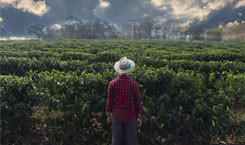With a lot of help from the progressing industrialization during the 19th century, coffee developed into a trade good with worldwide importance. Considering the high prices of coffee, it became and for some countries still is the most important trade entity. Through progress in technology, farmers were able to vastly decrease the cost of growing and harvesting and mainly, the risk and cost of worldwide transport decreased dramatically and modern steam and diesel-powered vessels began to roam the seven seas.
Modern washing, drying, and roasting processes make the production of coffee with a consistently high quality possible even for the fast-growing world market. Through modern propelling systems and efficient container cargo, the transport of coffee has been reduced to a couple of weeks versus the many months it had taken before. Today, no one has to live without coffee anymore.
Coffee used to be one of the most important and especially one of the most expensive goods brought over from the colonies. Only the richest and wealthiest could afford the aromatic beans and at times coffee was even prohibited in all of Prussia. Of course, all of that has changed today. With the coffee culture becoming more and more popular and diversified, Germany is the biggest export country of coffee goods in the world. In 2016, Germany imported 1,14 million tons of raw coffee for processing it into all kinds of goods containing coffee.
About 98% of the nine million tons of coffee harvested every year consist of Arabica and Robusta varieties. The more robust and less picky plant Coffea Canephora (Robusta beans) is mainly being grown in Southeast Asia, India, and Western Africa. The considerably more sensitive variety Arabica is mainly being found in areas located 800 meters or more above sea level. Because of the hilly environments preferred by this variety, Arabica farming usually requires far more labor and more human workforce. In East Africa and South America, most of the Arabica is still being farmed in micro-farms and small cooperatives.
Fairtrade
Sometimes only 5-15% of the retail price for coffee reaches the farmer in the exporting country. The constant price war is making it increasingly difficult for small cooperatives to survive. Fairtrade, whose best-known initiative is the FairTrade label, therefore tries to improve the situation of people at the end of the production chain through a variety of measures.
Around one-third of the world's green coffee production comes from Brazil, which is also the largest coffee-growing and consumer country. There the coffee is grown in fertile areas in different ways and after the harvest, it is usually filled into bags as dried green coffee, nowadays also often as bulk material in sea containers.
Drying reduces the weight and thus the transport costs and prevents unwanted fermentation. It is shipped from major ports such as Santos to Rotterdam or to the largest European coffee import port, Hamburg. In order to avoid the tax on roasted coffee and to guarantee consistently high quality, the actual refining, the roasting, only takes place in Germany and other destination countries such as Italy.
From bushes in Brazil to cups of espresso in cafés, 25 million people worldwide depend on coffee as farmers, plantation owners, cooperatives, traders, importers and exporters, brokers and refiners. In total, they produce 150 million bags of green coffee a year.

